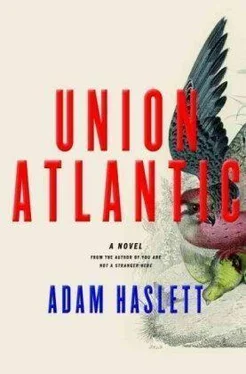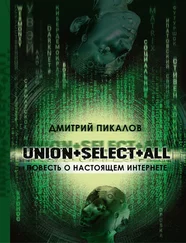Walking through Dasman Square the next day, he thought he saw Nate among a group of sailors, and he followed them for a while, waiting for a chance to get ahead of them but when he did he saw that he’d been mistaken and that their faces were all as blank and remorseless as his own. Again in the evening, on one of the narrow streets by the vegetable market, he became convinced that a kid in jeans and a sweatshirt making his way through the crowd up ahead must be Nate. And yet for all his certainty, the person turned out to be a man in his late twenties, Scandinavian or German, a reporter or photographer who when Doug grabbed him by the arm wheeled about looking wide-eyed with terror, as if he expected at that very moment to be stabbed.
On the appointed morning, he took a taxi to the port, where alongside the warehouse that the security firm had rented a few GIs stood leaning against their Humvee, chewing tobacco and eyeing their older civilian charges with a mixture of envy and contempt. Inside, the armored Suburbans were being loaded with food and equipment. The drive to the border would take about two hours, depending on the convoy traffic. Each of the eight men — four Americans, two Brits, a Chilean, and an Australian — signed their final waivers and were issued satellite phones.
Doug traveled in the lead car, which kept a hundred yards back from the Humvee that led them speeding up the six-lane highway. For miles they saw nothing but sand and limestone gravel and the occasional paved lot of rusting oil drums. As they reached the outskirts of Al Abdaly, rows of greenhouses came into view, hundreds of them shimmering in the sun, and beyond them fields full of oblong tanks, which the driver said were filled with tilapia, grown here by the thousands using the same groundwater that irrigated the strawberries under all that glass.
“Fish in the desert!” the guy beside Doug said. His name was Bill Gunther and he was from Tennessee. He had three kids in grade school and said he was being paid more than he’d imagined possible.
They arrived at the border truck stop and could see across the line into Iraq, past the unmanned checkpoint and the demilitarized zone, where a UN watchtower stood empty. It would be six or seven hours before they crossed, just after nightfall. They kept close to the vehicles, listening to the distant grind of earthmovers working up and down the line of control, flattening the dirt berm to make way for the first wave of the invading army.
At dusk, they began to hear jets streaking overhead. Moving off, away from the others, Doug wandered over the road and down a path that led past a diesel station to a shipping warehouse, its lot empty and its cargo doors shut.
Along this stretch the electric border fence still stood; behind it were coiled rows of concertina wire set in front of a wide, deep ditch in the sand. The empty highway beyond these defenses ran from here to Safwan: the highway of death, where the American planes had made of the retreating conscripts a smoldering graveyard back in ’91.
Soon, thankfully, the idleness and the thinking would end and the present would once more absorb all Doug’s attention. As the sounds of the impending blitz grew louder, the image of his young mother came to him once again, the person he remembered, the person he’d kept close, walking back down the aisle of the church with Nate. He could make no sense of it.
“You coming with us or what?” Gunther called out to him. He’d been sent by the team’s leader to find their stray member. “Looks like the show’s just about started.”
To the north, a massive cloud of dust hung suspended above the roar of the advancing troops, artillery rounds starting to flash within it like lightning revealing the shape of a distant thunderhead. Soon would come the earsplitting shout of bombs.
Checking the holster of his flak jacket, Doug fingered the metal of his gun.
Under the rules established by the firm, none of them knew the identity of their client. They had been told only that it was not a government but a private entity, one that was paying top dollar. There were documents and a computer in the offices of the oil depot at Umm Qasr and someone wanted them secured.
Adam Haslett is the author of the short story collection You Are Not a Stranger Here , which was a finalist for the Pulitzer Prize and the National Book Award. He has received fellowships from the Guggenheim Foundation, the Rockefeller Foundation, and the Fine Arts Work Center and is the recipient of a PEN/Malamud Award for accomplishment in short fiction. He lives in New York City.












